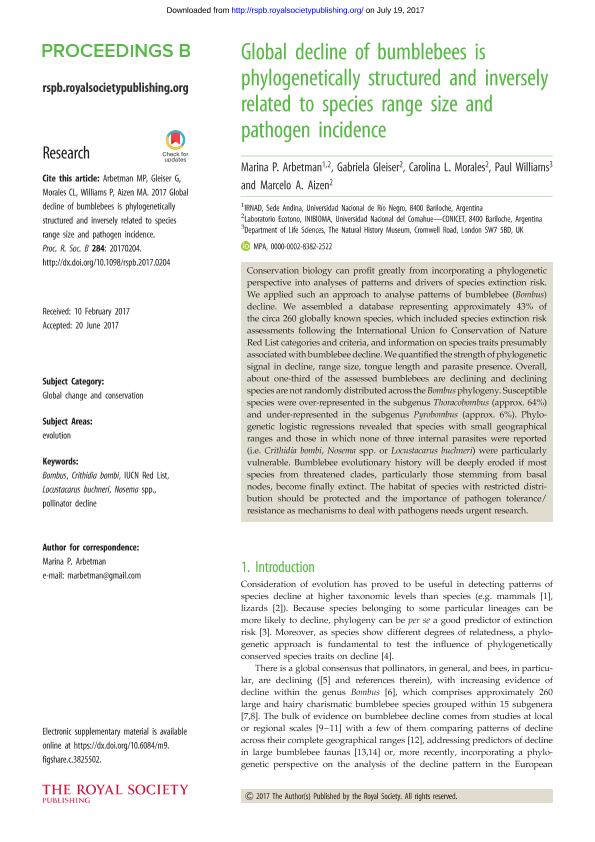Artículo
Global decline of bumblebees is phylogenetically structured and inversely related to species range size and pathogen incidence
Arbetman, Marina Paula; Gleiser, Gabriela Laura ; Morales, Carolina Laura
; Morales, Carolina Laura ; Williams, Paul; Aizen, Marcelo Adrian
; Williams, Paul; Aizen, Marcelo Adrian
 ; Morales, Carolina Laura
; Morales, Carolina Laura ; Williams, Paul; Aizen, Marcelo Adrian
; Williams, Paul; Aizen, Marcelo Adrian
Fecha de publicación:
19/07/2017
Editorial:
The Royal Society
Revista:
Proceedings of the Royal Society of London. Series B: Biological Sciences
ISSN:
0962-8452
Idioma:
Inglés
Tipo de recurso:
Artículo publicado
Clasificación temática:
Resumen
Conservation biology can profit greatly from incorporating a phylogenetic perspective into analyses of patterns and drivers of species extinction risk. We applied such an approach to analyse patterns of bumblebee (Bombus) decline. We assembled a database representing approximately 43% of the circa 260 globally known species, which included species extinction risk assessments following the International Union fo Conservation of Nature Red List categories and criteria, and information on species traits presumably associated with bumblebee decline. We quantified the strength of phylogenetic signal in decline, range size, tongue length and parasite presence. Overall, about one-third of the assessed bumblebees are declining and declining species are not randomly distributed across the Bombus phylogeny. Susceptible species were over-represented in the subgenus Thoracobombus (approx. 64%) and under-represented in the subgenus Pyrobombus (approx. 6%). Phylogenetic logistic regressions revealed that species with small geographical ranges and those in which none of three internal parasites were reported (i.e. Crithidia bombi, Nosema spp. or Locustacarus buchneri) were particularly vulnerable. Bumblebee evolutionary history will be deeply eroded if most species from threatened clades, particularly those stemming from basal nodes, become finally extinct. The habitat of species with restricted distribution should be protected and the importance of pathogen tolerance/ resistance as mechanisms to deal with pathogens needs urgent research.
Archivos asociados
Licencia
Identificadores
Colecciones
Articulos(INIBIOMA)
Articulos de INST. DE INVEST.EN BIODIVERSIDAD Y MEDIOAMBIENTE
Articulos de INST. DE INVEST.EN BIODIVERSIDAD Y MEDIOAMBIENTE
Citación
Arbetman, Marina Paula; Gleiser, Gabriela Laura; Morales, Carolina Laura; Williams, Paul; Aizen, Marcelo Adrian; Global decline of bumblebees is phylogenetically structured and inversely related to species range size and pathogen incidence; The Royal Society; Proceedings of the Royal Society of London. Series B: Biological Sciences; 284; 1859; 19-7-2017; 1-8
Compartir
Altmétricas



